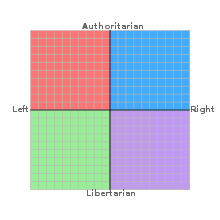The Political Compass
The Political Compass is a website which uses responses to a set of 62 propositions to rate political ideology in a political spectrum with two axes: economic (left–right) and social (authoritarian–libertarian).[1]
Website
The website does not reveal the people behind it, beyond the fact that it seems to be based in the United Kingdom.[2][3] At the bottom of any page on the website, it is stated that the copyright of "The Political Compass", which is claimed as a trademark, belongs to an organisation named Pace News Limited.[4] Pace News Limited is a company registered in New Zealand whose director is political journalist Wayne Brittenden.[5] According to The New York Times, the site is the work of Brittenden.[1] According to Tom Utley, writing in The Daily Telegraph, the site is connected to One World Action, a charity founded by Glenys Kinnock.[6] An early version of the site was published on One World Action's web server.[7]
Political model

The underlying theory of the political model used by "The Political Compass" is that political ideology may be better measured along two separate, independent axes. The economic (left–right) axis measures one's opinion of how the economy should be run: "left" is defined as the desire for the economy to be run by a cooperative collective agency (which can mean the state, but can also mean a network of communes) while "right" is defined as the desire for the economy to be left to the devices of competing individuals and organizations. The other axis (authoritarian–libertarian) measures one's political opinions in a social sense, regarding the amount of personal freedom that one would allow: "libertarianism" is defined as the belief that personal freedom should be maximised while "authoritarianism" is defined as the belief that authority should be obeyed.
A number of other multi-axis models of political thought exist and some are based on similar axes to "The Political Compass". A similar chart appeared in 1970 in The Floodgates of Anarchy by Albert Meltzer and Stuart Christie and in 1968 in the Rampart Journal of Individualist Thought by Maurice C. Bryson and William R. McDill.[9][10] Meltzer and Christie's and Bryson and McDill are pretty much the same as the Nolan Chart, but for a change of nomenclature and the political compass is also the same, but flipped and rotated 45° anti-clockwise.
The website does not explain its scoring system.[11] A number of writers, including Tom Utley[6] and Brian Patrick Mitchell,[7] have criticised its validity.
References
- LiCalzi O'Connell, Pamela (4 December 2003). "Online Diary". The New York Times. Retrieved 2 August 2017.
- "Shut Up, I'm A Libertarian", 11 July 2001 The Guardian. Retrieved 9 January 2018.
- "FAQ Q29". Politicalcompass.org. Retrieved 9 January 2018.
- "The Political Compass". The Political Compass. 11 October 2013. Retrieved 1 November 2013.
- "Pace News Limited". Opencorporates.com. Retrieved 9 January 2018.
- Utley, Tom. "I'm v. Right-wing, says the BBC, but it's not that simple". The Daily Telegraph. Retrieved 6 January 2017.
A lot of the questions in the test are very irritatingly phrased and impossible to answer properly, with only these four options available: "strongly agree", "agree", "disagree" and "strongly disagree
. - Mitchell, Brian Patrick. "Eight ways to run the country". Greenwood Publishing Group. 2007. p. 143. ISBN 978-0-275-99358-0.
- "The Political Compass". The Political Compass. 11 October 2013. Retrieved 1 November 2013.
- Meltzer, Albert; Christie, Stuart (1970). "Party Lines and Politics". The Floodgates of Anarchy. ISBN 0-900707-03-8.
- Bryson, Maurice C.; McDil, William R. (Summer 1968). "The Political Spectrum: A Bi-Dimensional Approach" (PDF). Rampart Journal of Individualist Thought. 4 (2).
- "The Political Compass FAQ #25". politicalcompass.org. Retrieved 8 January 2017.
Can you provide your scoring details[?]. [...] [W]e have a strict policy against releasing this information
.